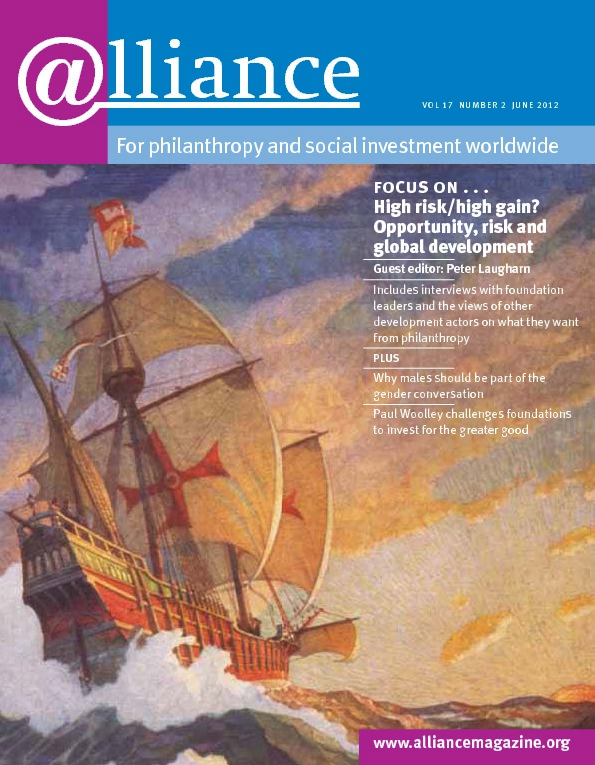What do we mean by risk in the context of foundations, Caroline Hartnell asked Don Mohanlal, president and CEO of the Nand & Jeet Khemka Foundation. In particular, what does he think about high risk/high gain activities, where the potential impact is great and the need urgent? One way to mitigate the risk, he says, is to bring in the right partners. Another key factor is leverage.
What do we mean by risk in the context of foundations?
Paul Ylvisaker said ‘Philanthropy is society’s passing gear’. Philanthropy then implies change. After all, we don’t fund to keep things as they are. And therein lies the risk. We also know from experience that grantmaking is both an art and a science.
I think there is an objective and a subjective side to risk. The objective side is looking at the organizations to be funded, their finances, their track record and so forth. The subjective side is that you need a good nose, a good intuitive sense, good judgement of people. Then again, we operate with moving parts: the context can change, so risk emerges. Ultimately, you are betting on people, so risk is inherent.
But there are a lot of mitigating factors. This is important because we need to be good custodians of the funds put at our disposal by the family or family foundation. Failure is a great teacher. How can we enhance the likelihood of success in those bets, given the context that you don’t get punished for failure?
To go back to your question about high risk/high gain activities, for me it is also about leverage. The return itself may be how you leverage your own funds and know-how with other players.
Are some Khemka grants more risky than others?
Yes, of course. If you grant funds to an existing school, it is unlikely to collapse; if you use funding to create something entirely new, the risk is higher. One way to mitigate your risk is knowing what you don’t know and trying to bring in partners who can compensate for that.
In the early stages of the P8 initiative,[1] when we were involved, we worked in a three-way partnership with the Environmental Capital Group and Cambridge University’s Programme for Sustainability Leadership. The thought leadership came from Cambridge while the Environmental Capital Group provided intellectual capital, know-how and experience; and this made our small grant go a lot further. In fact, it leveraged $1.2 billion of ‘green’ investments. It’s a huge gain, but back in 2007 there was a great deal of scepticism.
So the degree of risk depends partly on what stage the initiative is at, but it also has to do with the life cycle of the grantee. If it’s at a very early stage, even if its area of work is lower risk, it may still be risky because it’s an unknown quantity. The P8 was risky because it was an untrodden area then, not just because it was about climate change but because it was trying to bring in the large pension funds.
Is there a danger that the emphasis on measuring impact discourages foundations from taking risks?
It depends on how you approach measuring impact – is it to prove, or to improve? If it’s to improve, then it’s a virtuous cycle. You take what’s going on and see if it’s having an impact or not, and if not, why not. You can feed that back into the risky initiative.
When it comes to measuring impact with an area like climate change, the difficulty emerges with establishing causality. If you can disaggregate stand-alone projects from the wider initiatives, you might be able to see the effects. For example, with a renewable energy project promoting solar lamps to benefit low-income women, you can measure how many have a livelihood because of it. If you are looking at a broader horizon, like lowering emissions, there are so many actors involved, how could you establish that it was project A rather than project B, C or D that caused the improvement?
The words of the Spanish poet Antonio Machado ring so true: ‘Traveller, there are no paths. Paths are made by walking.’ I hope we will never shy away from making paths by walking.
1 The P8 initiative brings together senior leaders from some of the world’s largest public pension funds to develop actions addressing climate change.
Don Mohanlal is president and CEO of the Nand & Jeet Khemka Foundation. Email d.mohanlal@khemkafoundation.org


Comments (0)